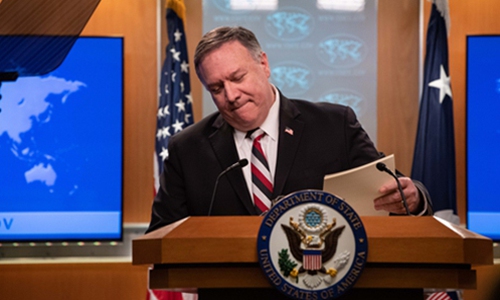BRI deal prompts Washington to threaten loyal ally
By Wang Wenwen Source:Global Times Published: 2020/5/25 21:18:29

US Secretary of State Mike Pompeo Photo: AFP
It was not long after US Secretary of State Mike Pompeo uttered the loving words "we stand by Australia" on Wednesday that he changed his tune.
On Sunday, this capricious politician said his country could "simply disconnect" from Australia over a deal under the China-proposed Belt and Road Initiative (BRI) involving one of the Australian states: Victoria.
As a loyal henchman of the US, Australia should be well prepared to be abandoned at any time. Australia sided with the US in a high-profile way when the latter called for a so-called independent global inquiry into the origins of the novel coronavirus that apparently targets China, yet US President Donald Trump threatened earlier this month to end offshore manufacturing for parts of the F-35 Joint Strike Fighter program, which could jeopardize thousands of Australian jobs.
Obviously, what is on the mind of Pompeo and his likes is only US self-interests, and Washington is not going to foot the bill for the lost Australian jobs. The state of Victoria is clear that its BRI deal will help create opportunities for local businesses and jobs, and that the deal is particularly important after the pandemic. This view is met with blistering US menaces of disconnecting ties.
Pompeo himself admitted that he does not know the nature of the projects under the BRI deal precisely. He stressed concerns about the security of US telecommunications networks, but Victoria's BRI deal does not involve telecommunications projects. The intrinsic antagonism against China and habitually bossy gesture toward one of the US' most loyal allies by Pompeo shows that he has abandoned both diplomacy and logic as a US secretary of state. Yet a mature diplomat is supposed to understand that diplomacy is not about menace.
Such a threat also reflects the deep-seated US hegemonic mentality. While hegemony is best understood as a form of power that combines coercion and persuasion, the US now uses only coercion. Alarmed by its decline of strength and eager to preserve its status as a global hegemon, the US is pulling every string imaginable to coerce its allies in a manner more favorable to its own interests.
Australia is already in a passive position in the face of wavering US policy. Canberra is forced to pick a side between Beijing and the Washington even when it is loath to jeopardize its relationship with China.
Australia should realize that the US views it only as a lackey. The possibility that the US will not come to Australia's rescue when needed is nothing new. While the US maintains its global hegemony by running roughshod over the interests of its allies, it does not offer any rewards.
Australian Prime Minister Scott Morrison responded to Pompeo's intervention by saying that the federal government has never supported Victoria's BRI involvement and urged states to "respect and recognize the role of the federal government in setting foreign policy." Obviously, Morrison did not take the interests of people in each state seriously.
Boosting employment and economic opportunities is one of the essential tasks for every government, especially local governments. As the US tries to block Victoria's BRI deal, what alternatives does the US offer?
Posted in: OBSERVER